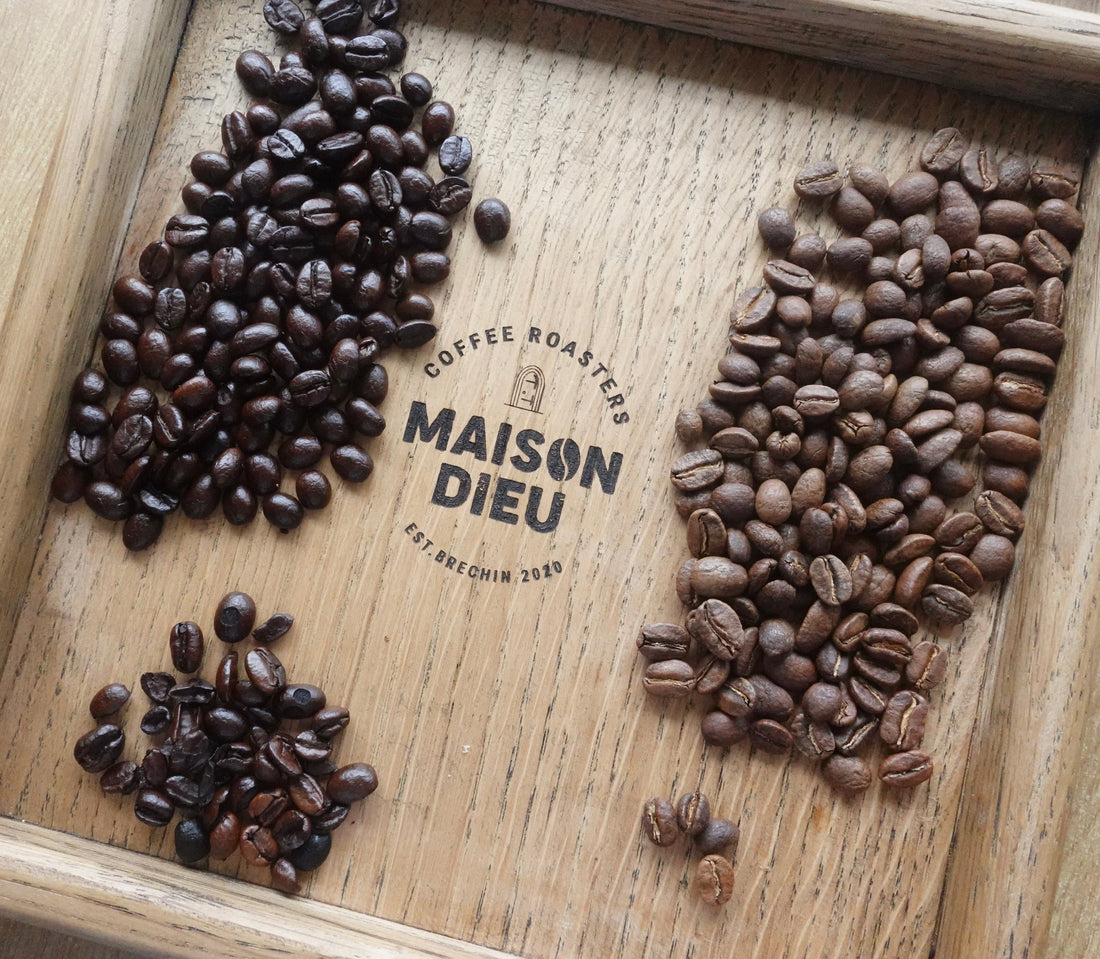If you’ve ever wondered why your cup tastes bitter at one place and bright and fruity at another, the secret often lies in the roast.
At Maison Dieu, we believe in letting coffee taste like coffee, not smoke. While big chains often go dark to cover up bad beans, we roast with care and only package the best coffee beans. Light to medium profiles. Fresh harvests. Beans you can trace back to the farm.
If you’ve ever wanted to know what really sets speciality coffee apart, this one’s for you.
How your coffee is roasted affects the flavour of your taste...
One of the main differences between chain coffee and speciality coffee is the roast profile.
Chain coffee is often dark roasted - almost to the point of being burnt.
Why?
-
Consistency: Dark roasting masks flavour inconsistencies in lower-grade beans.
-
Shelf Life: Dark roasts resist staling and preserve flavour longer, making logistics easier across thousands of locations.
Specialty roasters often use light to medium roast profiles, carefully tailored to the bean’s origin.
-
Light Roast: Highlights the bean’s natural flavours - floral, fruity, chocolaty.
-
Medium Roast: Balances sweetness, acidity, and body without overpowering complexity.
Instead of masking flaws, the goal is to elevate the bean’s inherent characteristics.
Quality
All coffee beans are graded by the SCAA (Specialty Coffee Association of America) on a scale out of 100. To earn the title of specialty, beans must score 80 or above. In contrast, commercial coffee typically scores between 65 and 80.
To scale up, chains often rely on commodity-grade beans, which are mass-produced and traded in bulk. These beans usually lack traceable origins, careful cultivation, and the distinct flavour profiles that define specialty-grade coffee.
Specialty coffee starts with high-grade beans, typically scoring 80+ on the SCA (Specialty Coffee Association) scale. These beans are often:
-
Single origin (from one farm, region, or cooperative)
-
Grown at high altitudes in ideal conditions
-
Carefully harvested and processed
Ethical Sourcing
Most chains supply chains are long and not always transparent. Farmers may receive only a small share of the profits, and quality is rarely prioritised over volume.
Speciality shops work closely with farmers and build relationships with importers to ensure that they are getting a fair price and the beans are sustainably grown.
Freshness
The freshness of the coffee that is served to customers changes massively when comparing speciality shops to chains.
Chains tend to buy their coffee in bulk and store it in warehouses for months, even up to a year at a time. They typically source beans from old harvests, as they are usually cheaper. That means by the time the coffee has been harvested, shipped, roasted, and then served, the coffee could be up to a year and a half old.
Whereas speciality shops purchase coffee in smaller amounts, working closely with the farmers to ensure they are getting the latest harvests. The beans are roasted soon after they have been shipped and served to customers. From bean to cup in a few months.
So, what makes a great cup of coffee?
It’s the bean, the roast, the sourcing, and the care. At Maison Dieu, we believe you deserve coffee that’s fresh, ethically sourced, and roasted to bring out its true character, not one drowned in bitterness.
Every cup you enjoy with us is a conscious choice for quality, sustainability, and flavour that tells a story from farm to cup.

